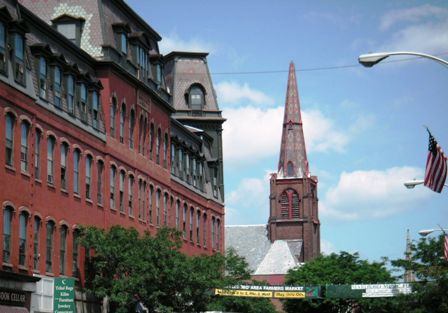|
interest groups (ch 10)
“A special interest group, or a pressure group, is an interest group you don’t like.” --Prof. Sid Wise, circa 1972
"Money is the mother's milk of politics." --Jesse Unruh (D), Speaker of the California Assembly from 1961 to 1968
Points to ponder:
- Interest group def: An interest group is a collection of individuals with a common interest who organize to influence government policy; the critical word is organize, and this means that women are not an interest group nor are teachers, but the National Organization for Women and the National Education Association do meet the definition
- Interest groups fill a void in the political system that political parties cannot fill: because the primary function of political parties is to win votes to get their people elected to office (remember they're vote-sucking machines), parties are disinclined to take very specific positions which may alienate prospective voters, and so those with specific policy positions they wish to see adopted by government form special organizations—interest groups—to press their positions
- Though not the intended object, interest groups are an important manifestation of what the founders sought to protect when they provided in the 1st amendment that “Congress shall make no law…abridging the freedom of speech…; or the right of the people peaceably to assemble, and to petition the government for a redress of grievances”
- It is useful to make a distinction among interest groups between functional and cause groups, where functional groups are those groups whose members have a personal, financial (typically economic livelihood) stake in the success of the group and cause groups include those who support the aims of the group but who will not be economically better or worse off if the group is successful. The AFL-CIO is a functional group because its primary purpose is to improve the economic life and employment conditions of its members, as is the American Medical Association which, among its other activities, seeks to represent the professional interests of doctors; Save the Whales, on the other hand, and the National Right to Life Committee are cause groups because their members will not be individually better off in an economic sense as a result of these organizations’ activities
- In their efforts to influence government policy, interest groups will use one or more of certain political resources
- troops, the number of members who can write letters, march in protests, and, most importantly, vote, among other forms of political participation
- money, especially for campaign contributions but also for other promotional purposes
- information--very often interest groups have control, sometimes monopoly control, over information that elected government officials and bureaucrats need to make or implement policy
- ability to disrupt (examples would include trucker's threats to strike to get government to do something about diesel prices or New Jersey doctors' actions to force change in malpractice insurance [A. Jacobs, "Anatomy of a strike" NYT 10 Mar 03])
- (very important) legitimacy, the presumption that interest groups--like the American Association of Retired Persons, the Veterans of Foreign Wars, and the Fishermen's Marketing Association--represent citizens (the elderly, veterans, and fishermen) who have real interests which deserve to be taken into account
- skill, really a meta-resource in the sense that skillful groups use whatever resources, no matter how meagre, with creativity and intelligence to move towards their goals (the Harry and Louise ads [373-74] were skillful, as were the activities of the the so-called Swift Boat Veterans for Truth [268-69]
note that these resources are convertible, which is to say that money can buy information, the more troops a group has may increase its ability to disrupt, and skilful use of money can mobilize new troops
- Interest group pluralism (352-59) is a perspective in political science that sees interest group activity as legitimate and appropriate in a democratic system; an assumption of interest group pluralism is that the presence of one group pushing from one side will generate the creation of another group which will push from the other side with the result that government officials essentially act as referees to balance the pressures and, so, find the public interest; another assumption is that there are a variety of resources available to interest groups—noted above—and that the “winner” depends not just on the relative resources of the groups but also on how skillfully they employ them (a classic case of a relatively resource-poor group that employed its resources very skillfully is the NAACP [National Association for the Advancement of Colored People] and its varieties of civil rights projects, certainly not least Brown v Board which overturned public school segregation)
- A useful concept in political science is that of veto power, which is the power to block opponents; as Coleman et al. make clear (353) an interest group can block actions it doens't favor by stopping it at any one of many different points which, if only threatened, may well force proponentns of change to come to the table to compromise with opponents
- Agenda-setting, which was considered in our study of media, is a critical task for interest groups
- Two of the critiques of pluralism (353-355) go hand-in-hand: groups with fewer political resources may well have difficulty getting their issues on the agenda, but a classic counterexample is the civil rights movement of the 1950s and 1960s (in which African-Americans--lacking voting rights, and having limited financial resources--creatively used marches, boycotts, the networking structure of black churches, and the painful but politically clumsy of their opponents to generate media attention, sympathy, and financial contributions
- Although interest groups are supposed to advance the goals of its members, it may happen, according to Michels' iron law of oligarchy, that group activity ends up serving the personal interests of group leaders and staff more than members, and this because the leaders/staff devote their lives full time to the organization, control the communications channels within the organization, have more information than do ordinary members, and, in any event, can buy-off or punish members who try to challenge them
- Though the focus is on the activities of groups pressuring government, it is also important to recognize the work of individual lobbyists, frequently lawyers, who work for various interests, and some of these individuals show up playing a part in ways one does not necessarily expect; witness, the vets (no, not veterans or veterinarians, but two Washington insiders chosen by the Obama and McCain campaigns to lead the search for vice presidential candidates; Obama's vetter was ultimately forced to step down within days because of criticism of his past lobbying activity)
- Politicians, especially presidential candidates, decry lobbyists but often end up bowing to their practical value; there are many examples--1, 2, 3
Questions to consider:
- In a head to head conflict between a functional group and cause group, which one is most likely to prevail? Why?
- The National Rifle Association: cause group or functional group?
- What evidence do Coleman et al. (371) offer for the claim that "many [group members] will also take action if asked?" Have you ever been asked to take action by a group of which you are a member? Did you?
- If many members of the AARP belong primarily for the material benefits provided (p. 360) rather than being politically committed, why does the AARP want to recruit so many members who may not be politically active?
- How might the committee system in Congress affect interest groups' legislative strategies (p. 377)? Where should interest groups target their congressional campaign contributions?
- How does the "public goods probem" (aka "free rider problem," "collective action problem," [but not the "prisoner's dilemma" which is something else entirely] relate to the paradox of voting?
|

